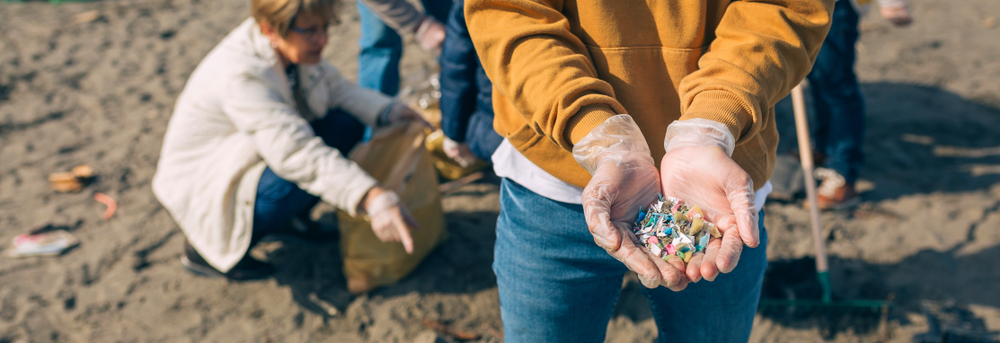https://www.onegreenplanet.org/environment/yes-even-your-seafood-has-plastic-in-it/?fbclid=IwAR1d1jEusGwM7koEmberqiCAN4iwxmFKX-aEzquwHVJb59Ac7--4xM3374o
Lead Image Source : David Pereiras/ Shutterstock.com
ADVERTISEMENT
Support OneGreenPlanet
Being publicly-funded gives us a greater chance to continue providing you with high quality content. Please support us!
Microplastic research is still in its early stages, but we know enough to know that it’s present in the fish we eat. Plastic in the ocean breaks down into microplastics, microscopic pieces of plastic, which then get eaten by fish and other sea creatures. Because of the volume of ocean plastic, it’s been found in all levels of the food chain in the ocean.
Research published in Scientific American shows just show prevalent microplastics are in the ocean. They’ve been found in Arctic sea ice and in beach sands. Chelsea Rochman, a microplastics researcher at the University of Toronto, said the findings on microplastics, “…still comes as a shock. It just shows that the mismanagement of our waste is coming back to us.”
Advertisement
How many microplastics are there? According to a UN report, 51 trillion microplastics are in the oceans. These micro plastic particles have been found in beer, salt, and bottled water. It’s also been found in tea bags. In short, microplastics have become ubiquitous in our food chain.
Another unsettling fact about microplastics is the substances that get stuck to them. Microplastics also attract pollutants and pesticides that end up sticking to them through the life of the plastic. Research is still uncovering the long-term effects of microplastics, including these pollutants, on human and animal bodies.
As scientists continue to research microplastics, we will know more about their long-term effects. For now, we need to stop putting so much plastic into the ocean and work to reduce our dependence on plastics. Microplastics’ presence in fish is just another reason to focus on a plant-based diet.
Read One Green Planet articles on microplastics:
Advertisement
- Glitter is Microplastic and it’s Time for it to Go!
- Trillions of Plastic Pieces Flow Into San Francisco Bay Every Year
- Micro-Plastics are a Mega Problem for Marine Animals – Here’s What We Can Do!
- There Are Billions of Microplastics in Your Teabags!
- Oh Boy! They’ve Found Microplastics in Bottled Water Too
- Microplastics in the Ocean Now Outnumber Stars in Our Galaxy — Let’s Fix This!
- Study Finds That Car Tires Are the Largest Source of Microplastics
There are products you may be using or habits you may have that contribute to plastic pollution. Learn more about how the use of Teabags, Cotton Swabs, Laundry, Contact Lenses, Glitter and Sheet Masks pollute our oceans so you can make more informed decisions going forward. There are also numerous simple actions and switches that can help cut plastic out of our lives including, making your own cosmetics, shampoo, toothpaste, soap, household cleaners, using mason jars, reusable bags/bottles/straws, and avoiding microbeads!
You can also consider reducing your meat, dairy and seafood consumption to avoid getting these chemicals into your diet. Eating more plant-based foods is known to help with chronic inflammation, heart health, mental wellbeing, fitness goals, nutritional needs, allergies, gut health and more! Dairy consumption also has been linked to many health problems, including acne, hormonal imbalance, cancer, prostate cancer and has many side effects. We highly recommend downloading the Food Monster App — with over 15,000 delicious recipes it is the largest meatless, plant-based, vegan and allergy-friendly recipe resource to help reduce your environmental footprint, save animals and get healthy! And, while you are at it, we encourage you to also learn about the environmental and health benefits of a plant-based diet.
Advertisement
- Weekly Vegan Meal Plans
- Plant-Based Health Resources
- Plant-Based Food & Recipes
- Plant-Based Nutrition Resources
- The Ultimate Guide to Plant-Based Nutrition
- Budget-Friendly Plant-Based Recipes
- High Protein Plant-Based Recipes
- Plant-Based Meal Prep
For more Animal, Earth, Life, Vegan Food, Health, and Recipe content published daily, subscribe to the One Green Planet Newsletter! Lastly, being publicly-funded gives us a greater chance to continue providing you with high quality content. Please consider supporting us by donating!

沒有留言:
張貼留言